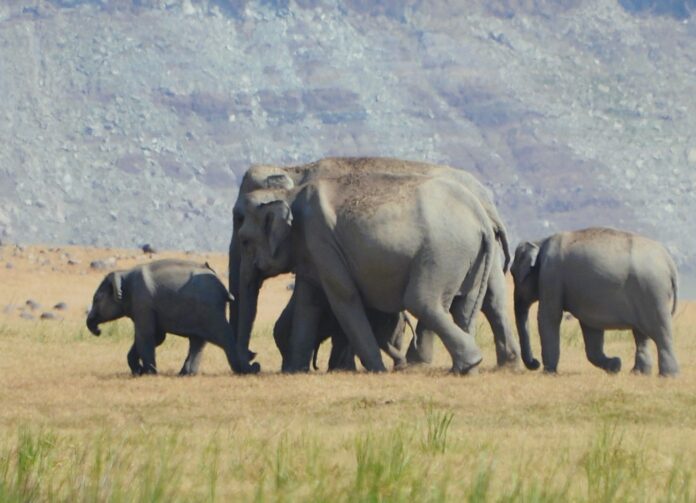This herd was filed in the grasslands of the Jim Corbett National Park, Uttarakhand, India.
The Asian Elephant (Elephas maximus) is a species separate from the African Elephants (Loxodonta africana and Loxodonta cyclotis) and differs from it in being smaller in size, with smaller ears and tusks only in the male elephants. The trunk in an Asian Elephant has only one finger like protection at the tip as against two in the African Species. They can not interbreed. Three sub species, the Srilankan Elephant (E. maximus maximus), the Indian Elephant (E. maximus indicus) and the Sumatran Elephant (E. maximus sumatranus) are recognized.
Highly social animals, they live in family groups dominated by the ‘Matriarch’ or the oldest female. Family groups may unite to form bigger herds. Males generally live in isolation or all male groups and leave the herd has they approach adolescence.
Asian Elephants prefer grass lands, scrub lands, evergreen and deciduous forests and avoid steep slopes. They are found in thirteen countries in South Asia, South East Asia and Southern China. The population in South East Asia and Southern China regions is about 16 to 20% of the global populations while the rest are found in Bangladesh, Bhutan, India, Nepal and Srilanka.
Asian Elephant populations have been seriously affected by habitat loss and fragmentation, illegal wild life trade and human wild life conflict. About half a million families are affected by crop raiding elephants each year in India which results in loss of income, food and also human lives.
As per a WWF report, there are less than 50 thousand Asian Elephant left in the wild having roughly halved in the last 60 to 75 years.
The Asian Elephant is listed as an endangered species in the IUCN Red list and all out efforts are needed to save these mammals from extinction.
Also See: Gajraj -Ecology of Asian Elephants at the Jim Corbett National Park, Uttarakhand, India
©Srimaa Communication
Acknowledgements-Dr. Yashpal Singh, Mrs. Neena Singh, Mr. Rajesh Bedi, Manoj Kumar Yadav
